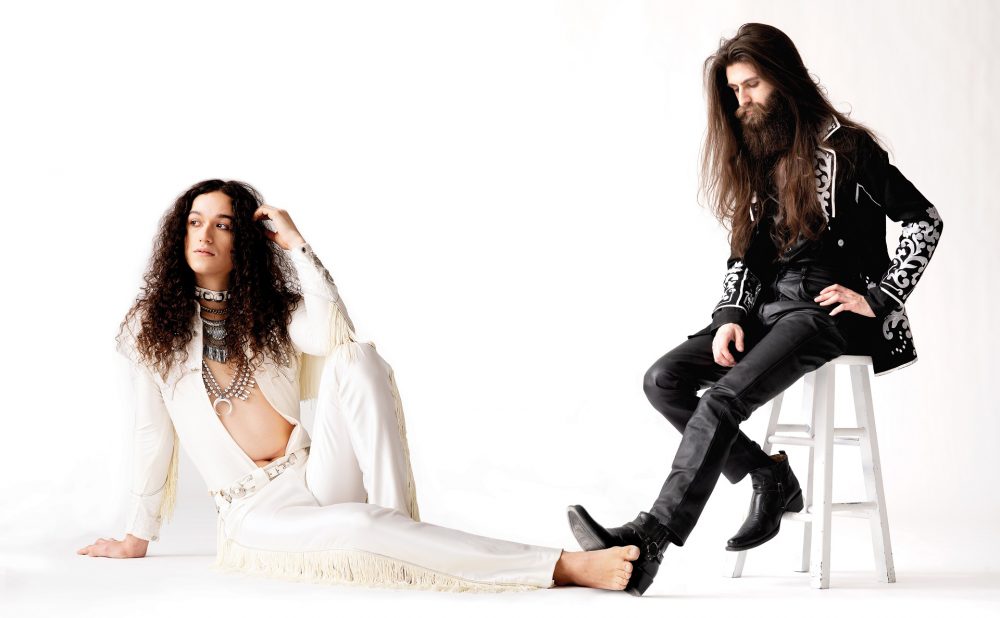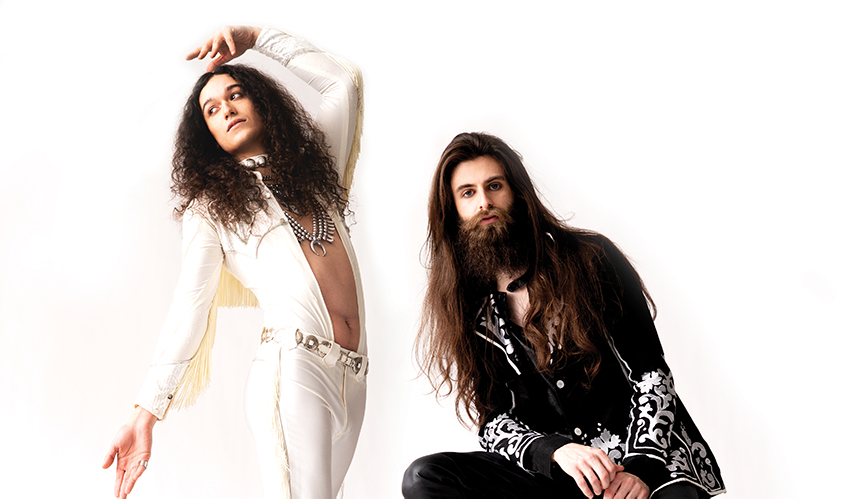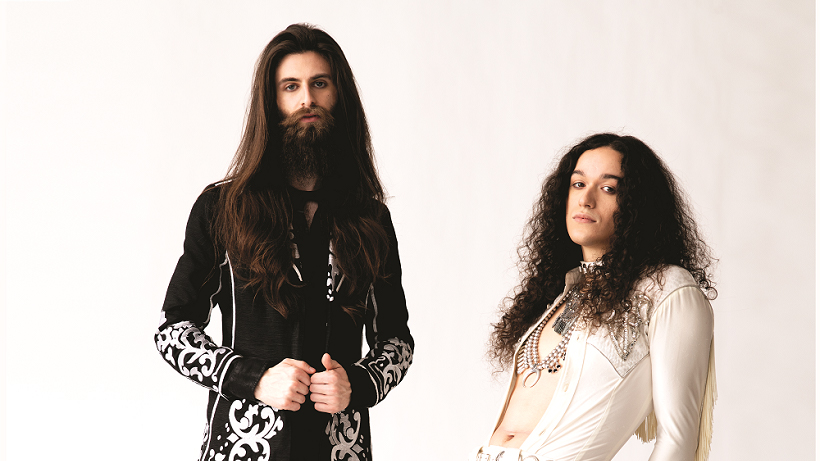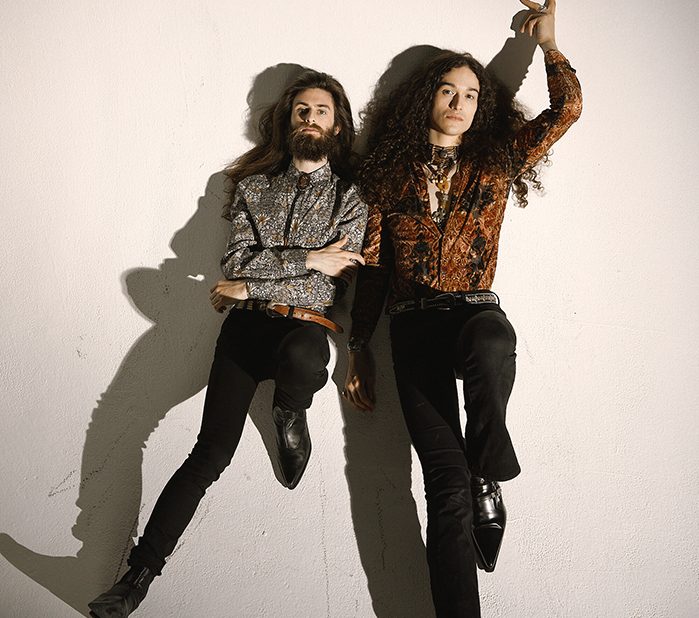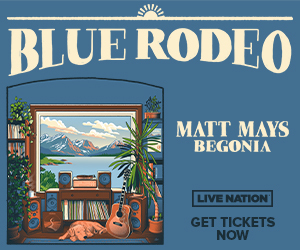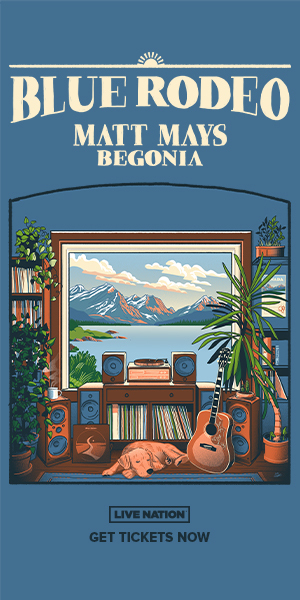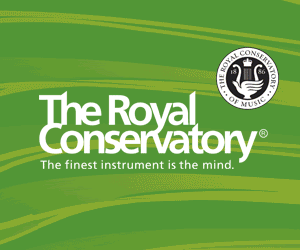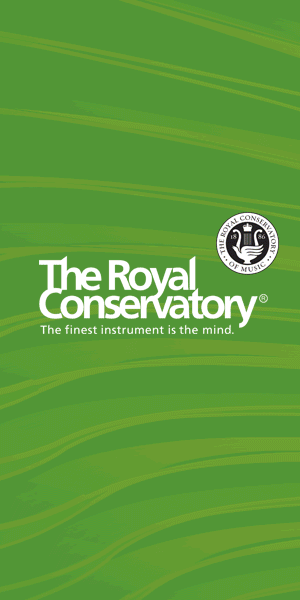Crown Lands
Prog-rock duo crown lands are on the edge of stardom and poised to bring politics, passion and really big hair back to rock and roll.
Crown Lands is at a turning point.
The Ontario-based rock duo’s Kevin Comeau and Cody Bowles have spent their pandemic having one of the biggest years of their lives. They released a critically acclaimed self-titled album, spent the summer breaking down and revolutionizing their sound, and just received two Juno nominations, for Breakthrough Artist of the Year and Rock Album of the Year.
Crown Lands’ music may pay tribute to heroes like Rush, but it’s anything but derivative; their bold political messaging, tributes to Indigenous heritage and kaleidoscopic, ever-changing style make them completely unlike anyone before them.
The first thing you notice when you listen to Crown Lands is the technical mastery the music demands. Comeau’s guitar is wailing, unrelenting and mathematically complex. Bowles’s voice howls their politically charged lyrics at a register reminiscent of the glory days of rock and roll.
But you can’t get the full Crown Lands experience unless you see them in action. With chest-length mops of hair and a slew of costumes that land somewhere on the axis between space cowboy and rock-opera magistrate, they’ve taken classic-rock aesthetics and elevated them to 21st-century opulence.
And after a year in isolation, they’re ready to crank it up a notch. The energy behind their rising star is palpable, and we’re lucky enough to catch them right when the whole world is starting to realize it. In fact, I was on the phone with Bowles and Comeau as they found out their new track, Context: Fearless Pt. 1, had been named Rock Record of the Week on BBC Radio.
“It feels like we’ve really turned a corner this week. It’s really, really exciting,” Comeau says, hopping back on the phone after getting the news.
They’re fresh off the release of two new songs, Context: Fearless Pt. 1 and Right Way Back, as well as their Juno Award nominations.
“It’s the purest joy I’ve ever experienced,” says Comeau . “The Junos are so huge, and it was just this beautiful, exciting moment we weren’t even expecting. We’ve just had tunnel vision for when we were releasing Context, and then this amazing celebration comes.
“And to see this music that we’ve been working so, so hard on for so many years, and for it to come out and for people to actually love it?”
“It’s just the best feeling. Obviously, it’s just been the greatest birthday I could imagine,” says Bowles, who’d turned 26 the day before. Exhausting as this whirlwind might be, it’s clear that for Crown Lands, there are no more days off.
After releasing one critically acclaimed album, many bands wouldn’t be clamouring to start from scratch. But after the pandemic paradigm-shifted the entire music industry, Comeau and Bowles realized they had the blank slate and the freedom they needed to finally push the boundaries on their sound.
“The pandemic started off really horrible,” says Bowles. “But now we have a shared sanctuary, a new recording studio, so we can have our daily communion with music together. It’s changed the game, having our own space.
“And after spending a year in an entirely different mindset, we’ve actually been able to flex muscles in our songwriting that we haven’t been able to before. And because of that, I think the new material is just way, way more musical and way more impressive.”
“It’s less trying to get from point A to point B,” adds Comeau. “And there’s nothing wrong with that, because I feel like we explored that really well on the self-titled record. But now we’re moving into this way more accomplished, really music-head type kind of music, which is exactly what we’ve always wanted.”
With mind-bending riffs and prodigious runtimes, the band’s latest tracks mark a distinct evolution into an aural experience that’s entirely different from anything they’ve done before.
“We’ve been trying to make ourselves happy first, and then make sure we make other people happy, too,” Comeau says of their prog-rock exploration. “Prog is what Cody and I grew up loving. We’d geek out so hard over that stuff. So now we’re really exploring using odd meter and figuring out how to make that stuff accessible to the average listener.
“And how do you convert people into seeing music like this? How do you make a song that’s unique but still makes people want to dance and move? These are the questions we’re asking ourselves, and it’s been a slice.”
“We were running away from who we really were for so long,” adds Bowles. “We’ve been afraid of admitting to the world that we really, really love stuff like Rush and Yes and Genesis. And now we’re turning this corner and accepting who we are. And people are actually loving this new direction, which is so sick, because we took a chance doing this. It was risky for us.”
Their new tracks have drawn immediate comparisons to their Canadian prog-rock heroes Rush, and that’s no accident—a shared love of Rush is what brought Comeau and Bowles together in the first place.
“A buddy of mine was auditioning for this band that Cody was playing drums for,” laughs Comeau. “And I had heard that Cody was a really big Rush fan. And I literally have a Rush tattoo on my butt. So I crashed the audition and mooned Cody, and it was literally like that scene in Step Brothers: Did we just become best friends?!”
When talking to Crown Lands, the remarkable connection that the two musicians share is clear. They literally finish each other’s sentences, often interjecting to advocate for the other or drop an inside joke, and despite the immense pressure they’re facing, they always just seem to be having so much fucking fun. But there’s a seriousness to Crown Lands that’s ever present beneath their neon flamboyance and retro showmanship— you’d be misunderstanding them if you didn’t realize they’re here on a mission.
The name Crown Lands comes from the term used to describe the land that was stolen from Indigenous peoples during the process of colonization. By taking a phrase that’s historically been used to justify and perpetuate colonial violence against Indigenous peoples, the band is reclaiming it as a part of their revolution.
And as a two-spirit Indigenous person, Bowles says there’s never been a choice whether or not to imbue a boldly political, decolonial message into their music.
“I feel like it’s my duty to honour my craft and talk about these issues. We have a platform that can potentially change the way people think—especially with people in rock music.
“There’s a lot of blue-collar workers who don’t quite understand what residential schools are, who are uncomfortable when you talk about Indigenous rights. And it’s integral to challenge that viewpoint, because they’re living in this country and they ought to know what happened here.
“The thing is, it’s never been something separate. It’s never crossed our minds not to talk about it. When we called ourselves Crown Lands, we knew we were going to talk about political things, because, as [Chinese artist] Ai Weiwei once said, Art is politics.”
Bowles is inspired not only by Crown Lands’ own experiences but by the ongoing phenomenon of Indigenous resilience across so-called Canada.
“I had heard that Cody was a really big Rush fan. And I literally have a Rush tattoo on my butt. So I crashed the audition, and I mooned Cody, and it was literally like that scene in Stepbrothers: oh, did we just become best friends?!”
Last year, the government’s mistreatment of Indigenous peoples reached a boiling point when the RCMP invaded sacred Wet’suwet’en territory on the West Coast. In solidarity, a series of blockades at major ports and railways sprang up across Turtle Island. The resulting movement lasted weeks and has been hailed as one of the most impactful and widespread acts of Indigenous solidarity in decades.
I spent many nights at the blockades in Vancouver myself, and know first-hand how remarkable those protests were.
I saw hundreds of strangers spend nights sleeping together on the streets, sharing food, writing songs, building sacred fires and uniting over both a shared fury at the status quo and a fiery, all-encompassing hope for something better.
“I was at those protests,” Bowles says. “And, you know, even to this day, right now, there’s people out there protesting. It’s something that happens regardless of whether or not the media is covering it. It’s a movement that is so inspiring and that is constantly active.
“We have a song called End of the Road, about the missing and murdered Indigenous women, children and two-spirit people on the Highway of Tears. And being part of those protests has really inspired a lot within me and Kevin, and there’s only more to come.
“There’s so much more we’re going to say about Indigenous issues and Indigenous rights. We’re going to open up the floodgates, and I think people are more ready for it than they’ve ever been before.”
The blues-rock genre that inspires Crown Lands’ music has a long and storied history as a soundtrack to the revolution. Rock has always been an inherently political genre: throughout the 70s and 80s, it was inexorably linked to a generation of youth defiance and was inseparable from its existence as an outlet for fury, despair and hope. But in the years since, Bowles and Comeau say, it’s gone soft.
“Rock has become safe. And that’s not something we want any part in. We’re never going to make rock that’s safe, because it’s just—to me, it’s just soulless. And I feel like if we have something to say, and we’re making people uncomfortable, then we’re in exactly the right place.”
Bowles grew up in a suburb outside of Toronto where they and their sibling were the only Indigenous people they knew. They were often subject to the racism and discrimination that lurks beneath Canada’s polite, liberal facade—but they’ve been able to turn to their music as a way of working through that trauma.
“Growing up, I felt really insulated and unseen. I experienced a lot of racism, but I feel like that only fuelled the fire of what I wanted to talk about in my music. And so, you know, it comes full circle, and I feel like I’ve come a long way to where I am.”
Ironically, the experience of alienation was just another thing bringing Crown Lands together. While growing up in Whitby, Ont., in a Jewish family, Comeau faced a similar experience.
“My sister and I were the only Jews in our school. In sixth grade, my sister started seeing swastikas drawn all over her locker and shit, and we faced so much alienation and exclusion. The thing is, Cody and I can both pass for white, even though we aren’t really, so we’ve both had to learn how to code ourselves to fit in.
“Even though we come from different cultures, we still experienced a lot of the same things growing up. And it’s amazing to me that we don’t just connect through music: we have this shared trauma that helps us create that music, as well.”
“There’s a lot of people who don’t quite understand what residential schools are. They’re living in this country, and they ought to know what happened here.”
With a year of pain, protest, evolution, adaptation and phenomenal success behind them, you might think Crown Lands would want to sit back for a second to take it all in, but the duo has no plans of slowing down.
Their technical skill is already so profound that watching them perform is almost surreal, and live shows are where they thrive: you can’t quite say you’ve experienced Crown Lands until you’ve seen them as well as heard them. Onstage, Comeau looks like a Jesus figure with a double-necked guitar; Bowles is an angel in jewel tones, backlit by a halo of billowing hair.
And their ethereal visuals are all the more striking when juxtaposed with the relentless, shredding power that radiates from their music. Don’t get too attached to their current sound, though—they’ve only just started to push the limits of what their music can look and sound like.
“It really feels like we’re finally finding that point as musicians where what we hear in our heads is now what’s coming out of our fingers,” says Comeau. “And we’re just gonna keep pushing that. And hopefully we can inspire this whole new generation of musicians to get into it and not be afraid to do what they want to do with music.
“Just in the past few days since the release, we’ve been seeing a bunch of kids posting covers of the songs… and that’s not something we’ve ever had before. So I really feel like we’re doing something special.”
“I think we’ve really just hit this point in the band where we’ve been sitting at around an eight and a half, but we’re finally ready to push it to a 10. And I’m excited to see how far we can go.”
They’re 1980s rock stars for the 21st century: by fighting modern-day fights, elevating glamrock aesthetics to the max and paying homage to their idols without ever being confined by them, they’re bringing the best of rock and roll to an entirely new generation.

